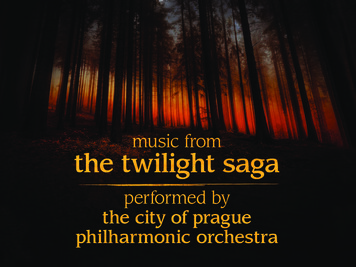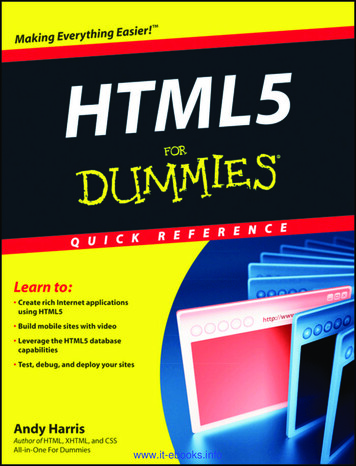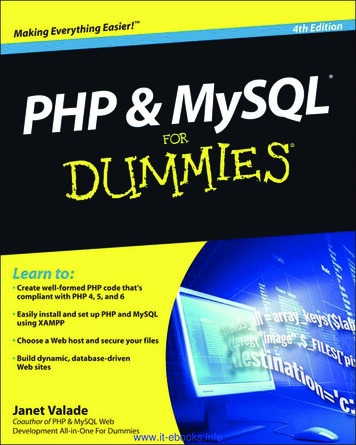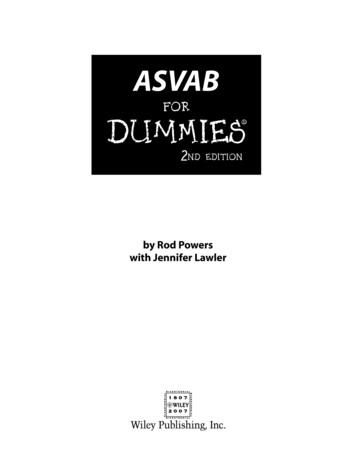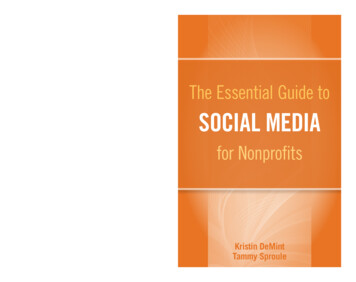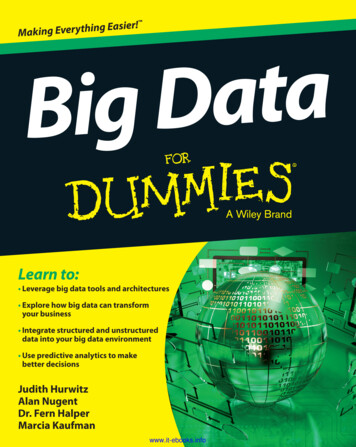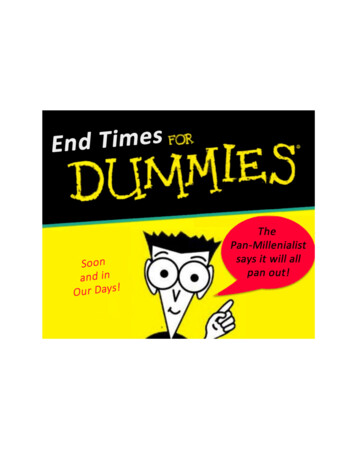
Transcription
End Times for DummiesByJoseph SquicciariniandScott MartinMen of Torahmenoftorah.comv2.5Copyright Ó 20181 ְתַּקע ְבּשׁוָֹפר ָגּדוֹל ְלֵחרוֵּתנוּ ְוָשׂא ֵנס ְלַקֵבּץ ָגֻּליּוֵֹתינוּ . ְוַקְבֵּצנוּ ַיַחד ֵמַא ְרַבּע ַכּ ְנפוֹת ָהָאֶרץ ְלַא ְרֵצנוּ : ַאָתּה ַײ ְמַקֵבּץ ִנְדֵחי ַﬠמּוֹ ִיְשָׂרֵאל C ָבּרוּ Sound the great shofar for our freedom,raise a banner to gather our exiles,and bring us together from the four corners of the earth into our land.Blessed are You, L-RD, Who gathers the dispersed of His people Israel.1Dummies image copyright 2018 & Trademark by John Wiley & Sons, Inc.End Times for Dummies2
Table of ContentsIntroduction . 5Lesson 0 – Overview . 7Lesson 1 – The Prophet Daniel . 9Daniel 7 – The Ancient of Days. 9Daniel 9 – Gabriel’s Visit .11Lesson 2 – The Prophet Joel .13Timeline Review from Lesson 1.13Locusts .13Who Are We Dealing With? .14Lesson 3 - Ezekiel .17Timeline Review from Lesson 2.17Resurrection .17Gog and Magog .17The Temple .18The River .18Lesson 4 – The Sages of Israel .19Timeline Review from Lesson 3.19Sukkot, Gog and Magog .19Noah and The Wellsprings .21Lesson 5 – Paul to the Thessalonian Assembly .23Timeline Review from Lesson 4.23The First Letter .23The Second Letter .23Lesson 6 – Peter’s Exhortations to the Gerei HaTzedek .25Timeline Review from Lesson 5.252 Peter.25Lesson 7 – The Olivet Discourse .29Timeline Review from Lesson 6.29Prologue to the Discourse .29The Discourse .29Timeline Recap #1 .33End Times for Dummies3
Lesson 8 – The Beginning of the End .35Timeline Review from Lesson 7.35The Apocalypse or Revelation from Yeshua to John .35Seals .35Trumpets .36Timeline Recap #2 .40Lesson 9 – The End of the Beginning .43Timeline Review from Lesson 8.43Bowls .43The Great Prostitute .44The Finale .44Timeline Recap #3 .47Lesson 10 – Summary .49Timeline Review from Lesson 9.49Appendix A – Timeline Points - Tanakh .53Appendix B – Timeline Points – Apostolic Scriptures .55Appendix C – Quotes from the Talmud.57End Times for Dummies4
IntroductionMost of the faithful fall into one of two categories. They either love to study prophecy or theycan’t stand the topic, seeing it as a major waste of time. I would argue that our position oughtto be somewhere in the middle. Many of us want to know what will happen in the end. It’snatural to be curious. What doesn’t make sense is an attitude about studying the end timesbecause it’s a waste of time. We’ve all heard, “I can’t change the end. It will happen as G-ddesigned it.” Or something along those lines. What we may forget is that G-d gave specificsabout the future – and expects us to know those facts – especially when times get tough. TheBible is not a survival manual, but it certainly can (and did2) bring hope in troubling times. Andmake no mistake, since Israel became a nation again in 1948, it’s clear that G-d’s propheticclock is ticking much closer to the final hour.The traditional daily standing prayer ends with,“That your beloved ones may be delivered, help with Your right hand andanswer me. Do it for the sake of Your Name; do it for the sake of Your righthand; do it for the sake of Your Torah; do it for the sake of Your holiness.”3I want to encourage you to study the end times along with us. Do it for the sake of yourchildren; do it for the sake of the other believers; do it for the sake of obedience to the Torah;do it to hasten the coming of the L-rd. I promise, when we’re done, your life will have adifferent perspective. As a parent, you will want to remind your children of the guaranteedpersecution that is to come. You will want to prepare them with answers. You will want to givethem hope, in times of trouble. Your own thoughts will turn more easily to your G-d, with arenewed desire to please Him, having learned what that will mean for your future.The RAMBAM’s thirteen principles of faith end with these:11. I believe with perfect faith that G-d rewards those who keep His commandments andpunishes those who transgress Him.12. I believe with perfect faith in the coming of Messiah. However long it takes, I will awaitHis coming every day.13. I believe with perfect faith that the dead will be brought back to life when G-d wills it tohappen.Join us, as we add just a little bit of Biblical and historical context to those three.23The Maccabean RevoltThe Complete ArtScroll Siddur, Nusach Ashkenaz, Mesorah Publications, p119.End Times for Dummies5
Lesson 0 – OverviewThe Bible describes two people groups: Jews and Joes. Salvation is from the Jews,4 and Jewscome first.5 The Bible also describes the history of mankind from its start to its finish. This is oneof the only ways that the G-d of Abraham identifies Himself as G-d. He knows the end from thebeginning.6 In general terms, mankind’s history has gone this way.G-d created the heavens and the earth.7 G-d gave man a single command,8 which manviolated.9 G-d fixed the problem of sin and disobedience by taking a righteous one from amongmen10 to satisfy the law.11 This One is the Righteous Messiah of Israel, Yeshua haTzadik (Jesusthe Righteous One).12He was sacrificed before the foundation of the world,13 thus allowing His righteousness to beimputed to those on the earth before His physical sacrifice in 30 CE.14 After His resurrection andascension, the apostles were told that He would return in the same manner in which He left.15Those faithful to the G-d of Abraham await the coming of His Messiah.16 If you were raised inthe church, this should be old hat for you. If you’re new to this, check the footnotes.Now that we have the basic history behind us, we can examine what has already beendescribed to us as our future, so that world events will not take us by surprise.17This study is designed to review, from the Scriptures, the basic outline of what will happen, towhom, for how long, and in what order.This is NOT a study of the Messiah of Israel, but rather a study of TIME. Messiah, I’m sure, willplay a big role, but we are focused on sequence, not sovereignty; perspectives, not people;events, not eternity.We will assume you know nothing more than what is outlined above.4John 4:22Romans 1:166Isaiah 46:8-117Genesis 1:1, 2:48Genesis 2:16-179Genesis 3:1110Talmud Bavli Berachot 62b; Romans 3:25-2611Ezekiel 18:4,20122 Corinthians 5:2113Revelation 5:9, 13:8; Matthew 25:34; Hebrews 4:3, 9:2614Psalm 22:30-31; Matthew 20:28; 1 Peter 2:2415Matthew 26:64; Acts 1:1116Daniel 7:13; Matthew 10:23, 16:27, 24:27, 44; John 4:2517Matthew 24:25; Mark 13:23; 2 Peter 3:175End Times for Dummies7
Lesson 1 – The Prophet DanielDaniel 7 – The Ancient of DaysWe begin by examining the Tanakh18 for key events in earth’s future. We will build our timelineas we study.Now let’s dig into Daniel’s prophesies and see if we can find some clarity. As we go there, l wantyou to assume that what Daniel sees is basically chronological, unless the text indicatesotherwise.Read Daniel 7:1-8. Make notes below about what you read. Remember, Daniel is seeing a visionof earth’s future. The nature of the text is prophesy and the words are symbolic. Don’t getworked up if seems strange. It is strange!How many beasts did Daniel see in his vision? Was one different from the others? In what way?What did Daniel notice about the little horn? Be specific.Read Daniel 7:9-14. Does this seem like a throne room? Who is on the throne? It seems like thenarrative was interrupted – by what?The second part of this is a famous passage – and one we have placed on our timeline. Is this“one like a son of man” presented to the Ancient of Days before or after the boasting of thelittle horn?Daniel seems as perplexed as we, so he asks for an interpretation. Read Daniel 7:15-18. In abroad sense, who wins in the end?18The Hebrew Scriptures are referred to by the acronym TaNaKh, which stands for Torah, Nevi’im and Khetuvim,which translates to Torah, Prophets and Writings. Check Yeshua’s comments in Matthew 5:17.End Times for Dummies9
What you just read was an overview of the history of mankind from the time after King David tothe Olam Haba, the World to Come. This is the framework within which we will place detailsfrom the other Scriptures.Like us, it appears that Daniel wanted some clarity with regard to this fourth beast. As before,Daniel will receive an overview of a time period, then receive more detail about it. Read Daniel7:19-22 for the overview.If you’ve ever heard of the antichrist, anti-messiah, man of lawlessness or man ofTorah-lessness, well, this is that guy. Make note of this passage, especially the phrase that Ihave bolded.“As I looked, this horn made war with the saints and prevailed over them,until the Ancient of Days came, and judgment was given for the saints of theMost High, and the time came when the saints possessed the kingdom.”(Daniel 7:21–22 ESV)Looks like this horn’s party got crashed. Remember that. I’m sure we will see this again.Finish reading the chapter for the details of what precedes the coming of the Ancient of Days.Write a summary of Daniel 7 below.Now with the background you have from Daniel 7, take a look at the passages in Appendix Aand see if you can place some of the keywords on our timeline. Relax. We’re just starting.World to ComeDispersedExileMillennial ReignEnd Times for Dummies10
Daniel 9 – Gabriel’s VisitLet’s continue in Daniel for more details. Read Daniel 9:1-2, 20-23 for the context of his nextvision. With whom is he speaking? How long must the exile be, according to Jeremiah?Now read Daniel 9:24-27. This is one of the richest prophetic passages in the Tanakh. List all thetime references or timing markers in the passage.It’s curious that at the opening of this chapter, Daniel is clear that the exile must be 70 years,yet the decree we read of in v24 that is about Israel, “your people,” and Jerusalem, “your holycity,” is 70 weeks.The Feast of Weeks, Shavu’ot, is really “Sevens.” Count seven sevens of days (49) and the nextday is the Yom Tov. The same is in play in Daniel. The text says literally, “seventy sevens aredecreed ” Only context and history can tell us if these “sevens” are days, weeks or years.In this same passage we are provide a list of what will be accomplished within these seventyweeks. List them below.In this 70 “week” period we see the following.There will be a decree to restore and build Jerusalem.19There will be an anointed “prince” seven “weeks” later.The city (Jerusalem) will be completed over a troubled 62 “week” period.20An anointed one shall be cut off and have nothing after the 62 “week” period. This 62“weeks” plus the previous 7 “week” period is a total of 69 “weeks.”5. Once the anointed one is cut off, the prince who is to come shall destroy the city andsanctuary. There will be war and desolation.6. This last prince shall make a covenant with “many” for the last of the 70 “weeks.”7. For ½ the week, this last prince shall put an end to sacrifice and offering.1.2.3.4.This is an amazing amount of detail. We know from history that Cyrus issued the command torebuild Jerusalem, fulfilling the prophecy of Jeremiah regarding the 70-year desolation of thecity, ending the Babylonian exile.1920Isaiah 44:26-28, 45:13, 2 Chronicles 36:21-23, Ezra 1:1-3, Jeremiah 25:12, 29:10Nehemiah 4:7,8,16-18End Times for Dummies11
The context of the first 69 “weeks” was fulfilled in history with incredible precision. Cyrusdecreed that Jerusalem should be rebuilt.21 It was built with a bit of trouble.22 Some 483 yearsafter the remnant returned to the Promised Land and began the rebuilding of Jerusalem andthe Temple, Yeshua was crucified in Jerusalem. The Jews rebelled against Rome and there waswar and destruction, leading to the current exile of the Jewish people.The problem we have with the prophesy in Daniel 9 is the 70th “week.” Everything in the first 69weeks of the prophecy indicate that the “weeks” refer to years. But the events described didNOT occur in the seven seconds, minutes, hours, days, months, years, decades or evencenturies after Yeshua’s death. This is why many Bible commentators refer to a gap.There must be a gap between the 69th week of Daniel’s vision and the 70th week. This gap isconsistent with Paul’s letters describing a partial hardening of the Jews so that the time of theGentiles may be fulfilled. When the full complement of non-Jews has come to believe inMessiah Yeshua, the 70th week of Daniel’s prophesy will begin.It is this 70th week with which we must study. The last prince shall make a covenant with “themany” for that last 7-year period. In the middle of that “week” he shall put an end to sacrificeand offering.With this information, let’s see if you can add more references to your timeline.World to ComeDispersedExileMillennial ReignWell done! There is probably no more complex passage of prophecy in all of Scripture!2122Ezra 1:1-2Nehemiah 4:1-9End Times for Dummies12
Lesson 2 – The Prophet JoelTimeline Review from Lesson 1Based on the Scripture we reviewed in Lesson 1, you should have the following on your timelineso far: Issuing of the decree to restore and rebuild Jerusalem Messiah the Prince Anti-Torah Man Son of Man Gap Covenant with the many for one week Middle of the week – stop to sacrifice and offeringLocustsThe prophet opens his word of the L-rd with a review of the amazingly destructive locusts. Hedetails cutting, swarming, hopping and destroying locusts. Read Joel 1 and describe what hashappened to Israel.This destruction of the land is apparently a harbinger of what is near. What is it?Check Joel 1:15.Joel 2:1-17 describes the Day of the L-rd. List the attributes described by the prophet.The second half of Joel, 2:18-29, takes a turn. What do you think happened? This seems to be adifferent period on our timeline. We certainly can see horrible destruction followed byincredible compassion and abundance.Let’s focus our timeline update on Joel 2:30-32. This is a description of what happens before theDay of the L-rd. As you rework your timeline, consider this remark from the prophet Malachi.“Behold, I will send you Elijah the prophetbefore the great and awesome day of the L-RD comes.”(Malachi 4:5 ESV)End Times for Dummies13
What comes after the Day of the L-rd? Let’s read Joel 3. Sounds like a show down! See if yourtimeline requires adjusting.World to ComeDispersedExileMillennial ReignWho Are We Dealing With?Alright, let’s take a detour and see if we can focus on the people involved with these end timesevents.The end times passages reference different people groups. Let’s try to get a list together. Wealready know that we have Jews and Joes. So, let’s start with those and divide them up.1.2.3.4.5.JewsTorah Keepers that believe that Yeshua is theMessiahTorah Keepers that do NOT believe Yeshua isthe MessiahNon-Torah Keepers that believe Yeshua is theMessiahReligious non-Jews (converts to Judaism)Non-religious Jews1.2.3.4.5.Non-JewsTorah Keepers that believe Yeshua is theMessiahTorah Keepers that do NOT believe Yeshua isthe MessiahNon-Torah Keepers that believe Yeshua is theMessiah (the visible “church”)Religious non-Jews (the unbelieving “church”)Non-religious non-JewsDo you agree with the list above? Let’s see if we can put some generic groups into ourcategories. Put the following in a numbered category from above.c Orthodox Jewsc Evangelical Christiansc “Messianic” Christians who keep theTorahc “Messianic” Christians who do NOTkeep the TorahEnd Times for DummiesccccccConservative JewsCatholicsReform JudaismBaptistsElevation Church membersJews living in Israel14
Let’s see if it’s possible to join these Jewish and non-Jewish groups into a single thread of “endtimes people groups.” Group 1 on both sides are believers in Messiah Yeshua. I think we can join these into agroup called, “Obedient Followers,” as they hold to the testimony of Yeshua, and keepthe commandments of G-d.23Group 2 on both sides are those who keep the commandments of G-d.24 Let’s call them“Observant.”Group 3 follow Yeshua, so let’s call them, “Followers.”Group 4 should be cast as “Religious.”Group 5 might be called “Indifferent.”During our study we must determine how G-d deals with these five groups.1.2.3.4.5.Obedient Followers (OF)Observant (O)Followers (F)Religious (R)Indifferent (I)This mixes Jews & non-Jews, which I don’t think G-d does, other than those in Messiah Yeshua.But we shall see as our study progresses.We shall see that the attitudes of men shall follow a on 1:2; 6:9; 12:17; 19:10Revelation 12:17End Times for Dummies15
Lesson 3 - EzekielTimeline Review from Lesson 2In Lesson 2, you should have added the following to your timeline: Day of the Lord Wonders in the Sky and on the earth (“signs”) Deliverance of whoever calls on the name of the L-rd Elijah the Prophet Judgement delivered on the nationsResurrectionY’chez’kel prophesied during the Babylonian exile. Read Ezekiel 37:1 – 14. Make special note ofthe reason for G-d’s miraculous work on behalf of His people.Read Ezekiel 37:15 – 28. This is an amazing passage! List the many blessings that G-d willprovide His people.Remember, David was King of Israel before the Babylonian captivity. What does the Scripturemean when it says, “My servant David shall be king over them?”Gog and MagogRead Ezekiel 38:1 – 16. Sounds like war against an undefended nation. What is the desiredresult?Read Ezekiel 38:17 – 39:25. Describe what you have read. Has the desired result changed?Explain.End Times for Dummies17
The TempleRead Ezekiel 40:1 – 42:20. It seems like a lot, but you don’t have to remember all themeasurements. Read it quickly, to get a sense of the text. Write your thoughts.Now read Ezekiel 43:1 – 12. There has been a movement – a migration – of the Holy One’sabode. From heaven to earth, His throne has been re-established in Israel.The RiverRead Ezekiel 47:1 – 12. Does this remind you of the Garden of Eden? Why?World to ComeDispersedExileMillennial ReignEnd Times for Dummies18
Lesson 4 – The Sages of IsraelTimeline Review from Lesson 3In Lesson 3, you should have added the following to your timeline: Israel’s dead resurrected Israel gathered to the land Joseph & Judah joined as one nation One king: David Israel Torah obedient25 G-d’s sanctuary established in Israel26 Battle against G-d: Gog and Magog New Temple River of LifeSukkot, Gog and MagogProminent in the Haftarah subjects of Sukkot is the War of Gog and Magog, the cataclysmicseries of battles that will result in the Final Redemption and the Messianic era. The Haftarah ofthe first day and that of the Sabbath of Chol HaMoed deal with this war. According to RASHI, thistopic is related to Sukkot because of the prophecy that those nations who would survive thewars would join Israel every year in celebrating the Sukkot festival.Read Zechariah 14:1 – 21.Nimukei Yosef to Megillah quotes a tradition from R’ HAI GAON that the victory over Gog andMagog will take place in the month of Tishrei – the month of Sukkot.R’ HIRSCH (Numbers 29:13) discusses the connection between Gog and Magog and Sukkot.In the name גוֹג , Gog, one recognizes the word ַגג , roof, and thereby at oncesees the contrast to sukkah, the weak, unstable covering of foliage. Actually,the whole history of mankind consists of this contrast. Just as people have thepower to make [themselves] safe and secure against their earthlycontemporaries by sturdy walls, so they delude themselves into thinking thatthey can make themselves safe and secure against that which comes fromabove – against G-d and His power to direct matters. They think that theycan find security in the protection of their own might, take their fate in their2526Hosea 3:5Isaiah 60:21, Joel 3:20, Amos 9:15End Times for Dummies19
own hands, and crown the building up of human greatness with gabled roofs,rendering them independent of G-d.The war of Gog and Magog is the battle of ַגג , roof, against סוָּכּה , sukkah, thefight of the ‘roof’ illusion of human greatness which never allows rest, against‘sukkah’ truth of cheerful confidence and serenity which comes of placingone’s trust in G-d’s protection.27R’ HIRSH’S exposition of the Gog-Magog relationship bases itself on the Hebrewgrammatical rule that the prefix מ , mem, expresses the idea of projectingsomething. For example, אוֹר , ohr is light; ָמאוֹר , maor, luminary, is a heavenlybody which projects light. So, too, ָגג , gag means roof – in R’ HIRSH’S view, itrepresents a philosophy that man can insulate himself against the heavenlypower of G-d – ָמגוֹג , magog is the attempt to project this philosophy on earth.28Zechariah’s prophecies came at a critical juncture in Israel’s history. Seventeenyears after King Cyrus had given permission for the Second Temple to be built,construction had stopped upon orders of King Ahasuerus and after theharassment and slanders of the gentile nations who surrounded Jerusalem.Morale was low, and despair was prevalent in the bedraggled Jewishsettlement. Then, G-d sent Zechariah to command the people, under theirleaders Zerubavel and Joshua, to ignore their fears and resume construction ofthe Temple. G-d promised them success and, indeed, soon after that KingDarius of Persia sanctioned the undertaking. Zechariah prophecies that thecataclysmic war of Gog and Magog will climax with the final redemption andthe acknowledgement by the nations that HASHEM alone is King, and thatIsrael is His people. This realization will be celebrated on Sukkot – for whichreason it was chosen as the Haftarah for the first day of Sukkot.29Read Deuteronomy 16:18 – 20.The passage from Deuteronomy is the beginning of Portion Shoftim (Judges). It opens with acommand to “appoint judges (shoftim) and police officers (shotrim) for yourself.”The Midrash stresses the need for both of these roles: “Without policemen, there is no judge.For if the court finds a person guilty, once he leaves the courtroom, the judge is powerlessunless the policeman takes control.”30In his prophecy of the Messianic Era, Isaiah mentions judges, but not police.27The GUTNICK Edition ChumashArtScroll Ezekiel, p58029ArtScroll commentary to Ezekiel 3830Tanchuma Shoftim 228End Times for Dummies20
“And I will restore your judges as at the first, and your counselors as at thebeginning. Afterward you shall be called the city of righteousness, the faithfulcity.”(Isaiah 1:26 ESV)This is because the Messianic Era will witness the disappearance of evil and selfishness, so therewill be no need for policemen who force people to be righteous.“And on that day, declares the L-RD of hosts, I will cut off the names of theidols from the land, so that they shall be remembered no more. And also I willremove from the land the prophets and the spirit of uncleanness.”(Zechariah 13:2 ESV)However, there will remain a requirement for judges who will pass laws, study Torah, andprovide practical direction to the Jewish people in matters of Torah and its commandments.Thus, in truth, policemen are secondary assistants to the judges. Only in a case where the judgeis incapable of enforcing justice, must one resort to policemen, who work with the “stick andthe whip,” forcing the guilty party to accept the judge’s decision Policemen are not an intrinsiclegal necessity, and in a time when people are respectful, such as the Messianic Era, they willbe rendered redundant.However, since all aspects of Torah are eternal, there will be a role for police even after theRedemption, only then it will be a positive one – to announce and make public affairs of theJudges and to assist the people in fulfilling the directives of the courts.31Noah and The WellspringsIn the Zohar,32 the following prediction is recorded:In the six hundredth year of the sixth millennium [i.e. 5500 (1740CE)], therewill be an opening of the supernal gates of wisdom and the lower wellspringsof wisdom, preparing the world for the seventh millennium [i.e. the finalredemption], like a person who begins to prepare himself for Shabbos onFriday, when the sun heads downwards. This is indicated by the verse, “In thesix hundredth year of Noach’s life all the wellsprings of the great depthsburst forth, and the apertures of the skies opened up.”33By the year 1840, two major schools of thought had caused revolutions intheir respective spheres of influence. In the Jewish world, the Chasidicmovement had popularized the teachings of mysticism and Kabalah. In the31Based on Sichas Shabbos Parshas Shoftim 5751Zohar I 117a33Genesis 6:1132End Times for Dummies21
secular world the Industrial Revolution had reached its peak. These twodevelopments were the, “opening of the supernal gates of wisdom and thelower wellsprings of wisdom,” to which the Zohar refers.The Zohar states that these two developments were both a preparation forthe final redemptio
End Times for Dummies 7 Lesson 0 – Overview The Bible describes two people groups: Jews and Joes. Salvation is from the Jews,4 and Jews come first.5 The Bible also describes the his
